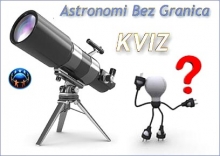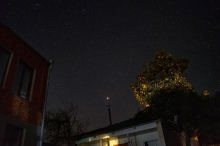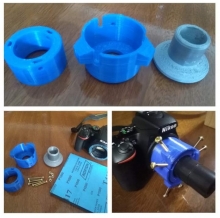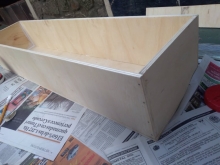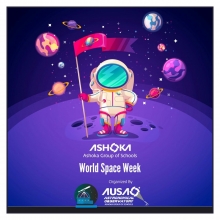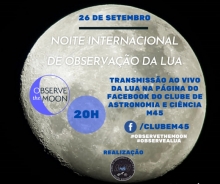Avivah Yamani – AWB National Coordinator for Indonesia
By Peggy Walker
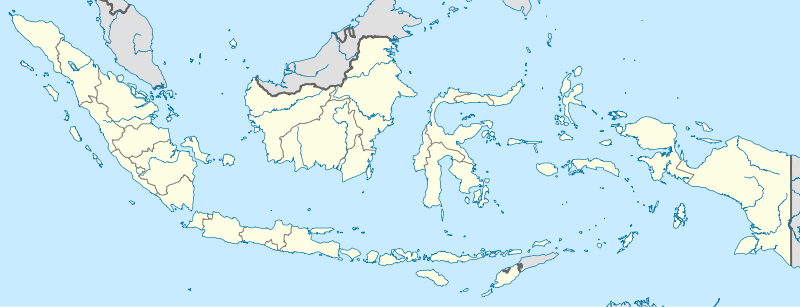 |
| Bandung [ban’ dun] is the capital of West Java Province and is the 3rd largest city and the 2nd largest metropolitan area. It is located in a river basin and is surrounded by volcanic mountains where the Dutch grew tea on plantations in the early 18th Century. 6* 54’ 53.08*S 107* 36’ 35.32*E |
Those who are well traveled have most likely visited one of the 17,508 islands in the country of Indonesia. But little do these visitors know that there is one place that outshines the rest—Bandung, West Java. It is here that a true gem of Oceania resides: Avivah Yamani. She is a most gracious, cheery, 31-year-old astrophysicist who can often be found setting up her scopes with her team at a local coffee shop or mall.
After receiving her Master’s degree from the Institut Teknologi Bandung, Avivah pursued research in planetary systems, particularly in planetary stability and evolution. Now she spends most of her time spreading the word about astronomy through various avenues, such as the Indonesian Astronomy Communication and Education Organization, Langitselatan (www.langitselatan.com); the Indonesian astronomy magazine Majalah Astronomi, for which she is co-editor; 365 Days of Astronomy, for which she is project manager; her blogs; and, finally, her own sidewalk astronomy.
Avivah fell in love with sidewalk astronomy in 2009 when she became the point of contact for the International Year of Astronomy’s “100 Hours of Astronomy” program. As a highly educated woman, she had to learn how to use the right terminology for the general public. When she would talk with her fellow astronomy students at the university, it was always from the view point of an astronomer. But she soon found that her vocabulary was not easily understood by the public. It took hard work—including a lot of listening to students and teachers, and reading many press releases—to get a better understanding of the terminology she needed to use when working with elementary students and the public at large.
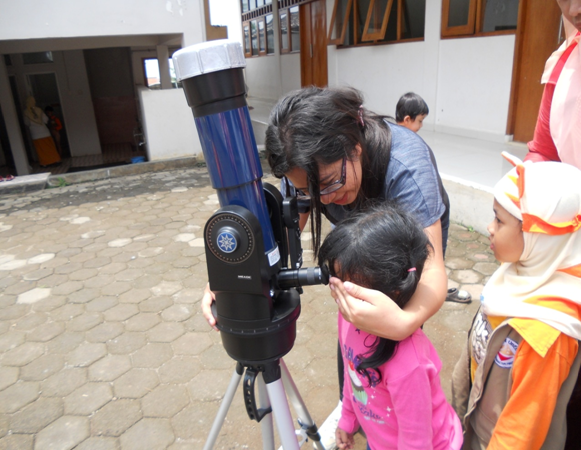 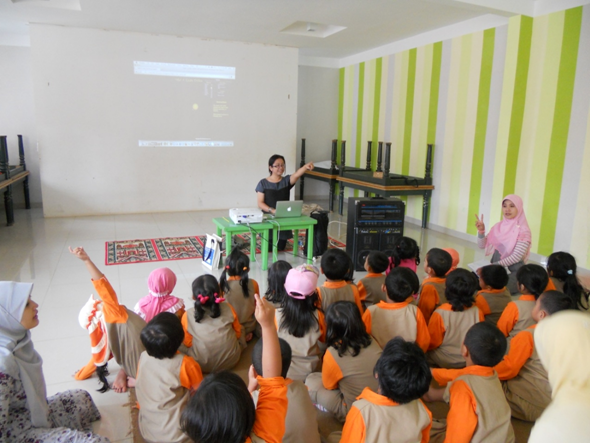 |
| Avivah is introducing kindergarteners to astronomy with a classroom presentation and then solar observing. |
A natural-born communicator, Avivah loves to share her love of the night sky with other people. The more she would set up her telescope in front of the mall, the more people would come up and talk to her. And the more she got hooked! Soon, as a blogger for IYA 2009, she encountered a “real star of astronomy” named Mike Simmons. When Mike asked her to be the National Coordinator for Indonesia, she was delighted, saying she wanted to “continue to gather with people from everywhere who have a common love of the sky”.
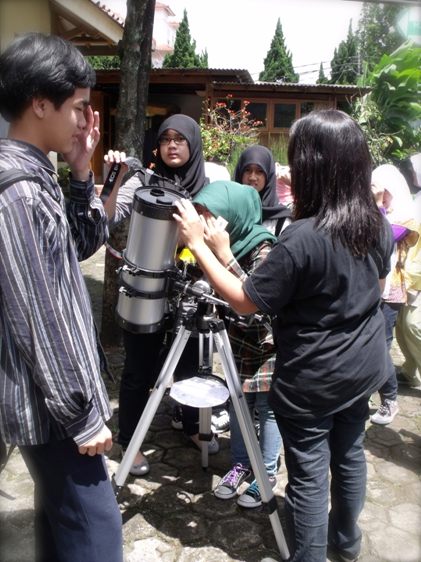 |
| Avivah conducts solar observing with junior high school students |
Now, with a team of six to eight people, Avivah is frequently asked to speak in schools or to host a solar observing session. Her team also conducts training for teachers from Bandung and Jakarta, the capital of Indonesia. Oftentimes, the public and students may also be in attendance because they too want to have an understanding of the basics of astronomy. Sometimes she collaborates with students to build telescopes and solar filter glasses for observing eclipses.
Avivah continues to impact her community, mainly by making the population more aware of astronomy and the night sky. She does this by partnering with local amateur astronomy clubs and co-hosting a national star party. Currently this same collaboration is being focused on planning an event for the Transit of Venus, since it will be viewed in its entirety in her region! For Global Astronomy Month this April, Avivah is planning Indonesia’s participation in the Global Star Party, Sun Day, and 30 Days of StarPeace. She continues to reach beyond her borders and will partner once again with fellow National Coordinator Armando Lee in the Philippines. She loves to do this—but often finds that Armando has the better skies while she gets the clouds!
Avivah often needs to take advantage of solar observing, mainly due to the fact that clouds typically find their way into her country by 3:00 p.m.—thus eliminating the potential for star parties or regularly scheduled night observing. This is particularly a challenge in Indonesia’s rainy season, which spans from October to April. However, in June and July she makes up for lost time.
The public often is introduced to astronomy by seeing a meteor shower. One project that has helped spread astronomy interest is the Astronomy Olympics, an international competition for High School students which, however, does require a good understanding of math and physics. Avivah notes that “The schools here offer geography and astronomy in the classrooms, and the high school also covers optics and the properties of light.” She adds that “Jakarta and Tenggarong on Borneo Island both have planetariums that help to educate the public as well.”
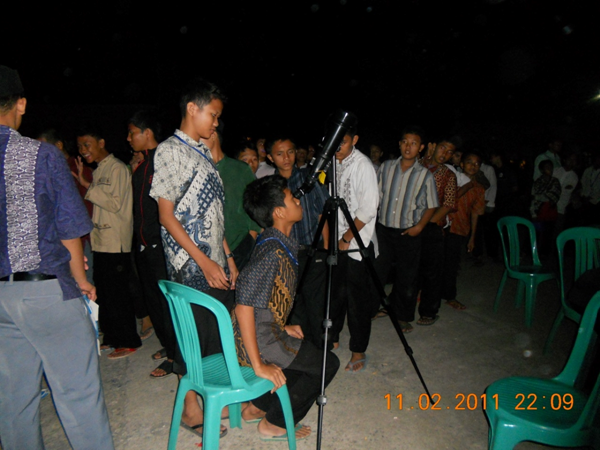 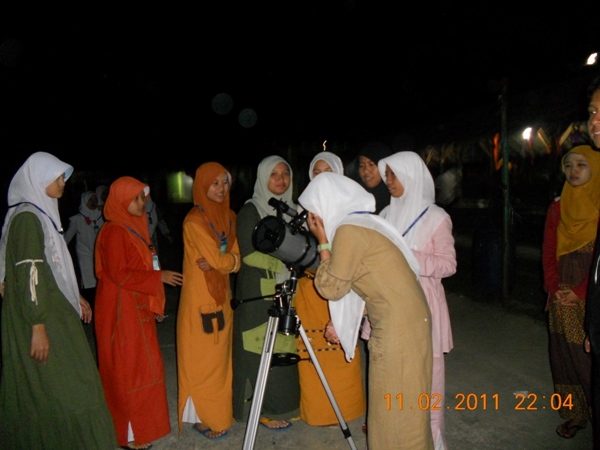 |
| This year, Avivah and her team hosted a science party with students at an Islamic boarding school |
The response from the community has been pretty good, she concludes, since “people are always curious about astronomy and how it relates to daily life.” One interesting aspect is that when the Muslims (who make up a large part of the Indonesian population) observe their fasting time, it starts on a crescent moon and lasts the full month—ending on the crescent moon. That has opened the door to interesting conversations about the phases of the moon and the beauty of the crescent moon in particular. Interest in astronomy in Indonesia is growing, and when Avivah sets up her telescope at a local community gathering, you can be sure that wonderful conversations will begin.
Currently, Avivah finds herself trying to address concerns that the media, as much in Indonesia as everywhere else, tend to arouse whenever they cover astronomy events. For example, any time there is a solar flare, many citizens are concerned for their life and how it will impact them here on Earth. In addition, she often finds herself trying to calm the public’s irrational fears related to the “2012 Doomsday Prophecies.” She and her team members write many articles to address the concerns the public has voiced to her. She has come to realize that many are reacting fearfully because of their religious faith—and she tries to calm such fears in a positive way by showing the scientific perspective without belittling anyone’s religion.
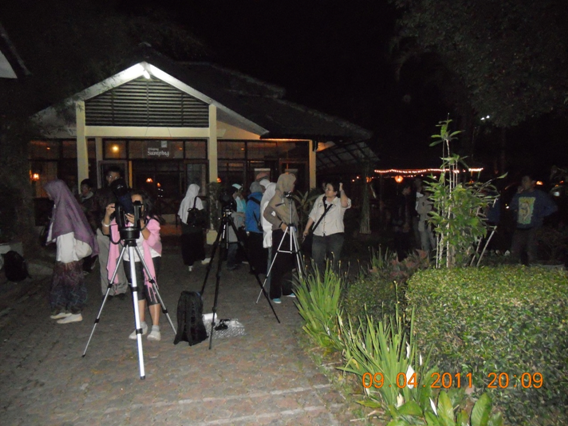 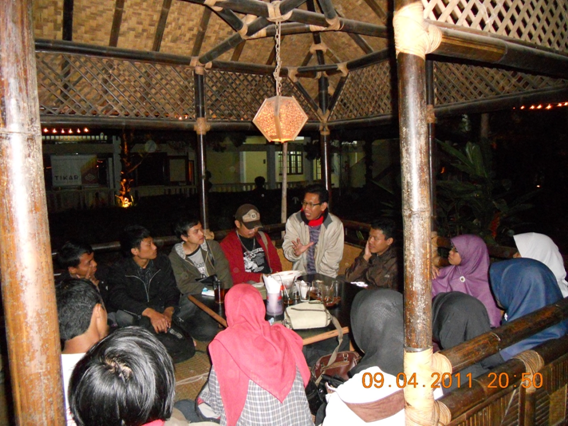 |
| Avivah set up her telescope at a local community gathering and later found many people interested in the discussion that got started and hung around for a little while. |
Until such time as her research calls her back to full-time work, you can keep up with Avivah at www.langitselatan.com, the Astronomy Communication and Education website that she built with friends; and at www.majalahastronomi.com, the online site of Majalah Astronomi. Her work with these publications includes translating articles into Indonesian for the Astronomy Communication and Education site, as well as posting articles in an English-language section of Majalah Astronomi from people who want to share their experience in astronomy.
Read about other National Coordinators featured in National Coordinator Spotlight.









